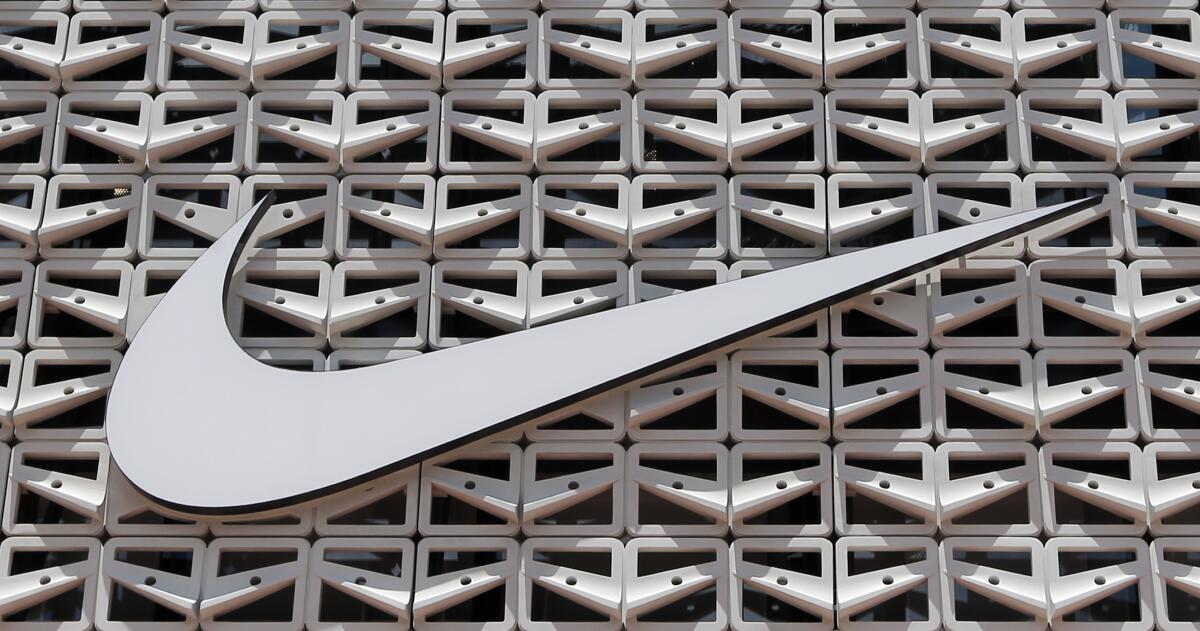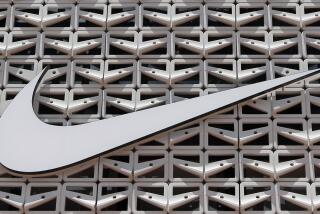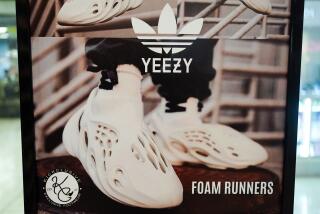Nike stocks see their biggest drop since 2001 amid weak fiscal outlook

- Share via
Nike Inc. shares sank after the sneaker company’s full-year outlook missed expectations, stoking investor concerns about waning demand and competition from upstarts On and Hoka, as well as rival Adidas.
The world’s largest sportswear company sees revenue declining in the mid-single digits in the company’s current fiscal year, which began this month. Analysts had expected growth of about 2% this year, according to estimates compiled by Bloomberg.
The shares fell as much as 18% on Friday morning — Nike’s biggest fall since 2001 — wiping out billions in market value. The stock had already declined 17% over the last 12 months.
Other athletic retailers including JD Sports Fashion and Puma were dragged down. Adidas gained early Friday in Frankfurt, Germany, but the stock later erased the gain.
After years of dominance, Nike is struggling to churn out hot-selling footwear to replace top sellers such as Air Force 1 and Dunk sneakers. The worsening performance raises the pressure on senior leaders.
Chief Executive John Donahoe has resorted to layoffs and other belt-tightening measures after a move to prioritize Nike’s own sales channels failed to produce the promised levels of profits and growth.
In recent years, the company also curtailed its reliance on retail partners, which in turn have begun pushing rival brands. The wave of competition from newer brands such as On Holding and Deckers Outdoor Corp.’s Hoka pushed Nike to vow to prioritize sports, new products and wholesale partners.
The trajectory contrasts with that of Adidas, whose new chief executive, Bjorn Gulden, has embraced retail partners again and sped up the introduction of new products like the retro Samba sneaker, which has become a hit and fueled a new era of growth. He’s also sharpened the company’s focus on athletic performance.
Nike’s revenue in the fourth quarter fell 1.7% to $12.6 billion, missing the average of analyst estimates. A notable laggard was the Converse subsidiary, known for its Chuck Taylor sneakers, where revenue plummeted 18% due to soft sales in both North America and Western Europe.
Donahoe took over Nike in January 2020, following many years leading tech companies including ServiceNow Inc. and EBay. Before that, he had spent nearly two decades at the management consulting firm Bain & Company Inc., where in 1999 he became chief executive.
Some analysts have criticized Donahoe’s leadership approach. Sam Poser of Williams Trading said recently that Nike’s current senior executives lack the “instinct and experience that the prior team had.”
That’s left Nike in a “push model” situation, Poser said, whereby a company has to convince consumers to buy its products rather than the opposite scenario, where people are struggling to get their hands on the brand’s shoes and apparel.
It’s a marked difference from what Nike was experiencing for much of the past decade, during which it has basically doubled revenue from $25 billion in 2013 to more than $50 billion today. While annual sales dipped during the onset of the COVID-19 pandemic in 2020, the growth has otherwise been remarkable until recent quarters.
Now, Nike leaders are asking for patience as the company looks to accelerate the release of new franchises in the fitness and lifestyle categories in the second half of this fiscal year and then bring on more new products over the next couple of years.
“A comeback at this scale takes time,” Chief Financial Officer Matt Friend said during the company’s call with analysts. But he cautioned that shifting the product lineup will erode sales in the short term.
Nike executives blamed the slowdown in part on lifestyle brands, including Air Force 1 and Nike Dunks. The category’s sales fell for the first time since the start of the pandemic, when demand for casual attire took off.
The issues could prompt double-digit downgrades to analysts’ earnings expectations for the company during this year and next, according to analyst James Grzinic of Jefferies. Moreover, the era of European shoe companies’ stock reactions tracking Nike’s is breaking down.
Adidas is now the “preferred sporting brand for global investors” as Nike and Lululemon Athletica Inc. lose momentum, Grzinic said in a note.
Weakness in Nike’s own sales channels is also a “reason for concern, as the activewear giant could be turning its core shoppers away due to lack of newness,” said Bloomberg Intelligence analyst Poonam Goyal.
More to Read
Inside the business of entertainment
The Wide Shot brings you news, analysis and insights on everything from streaming wars to production — and what it all means for the future.
You may occasionally receive promotional content from the Los Angeles Times.










